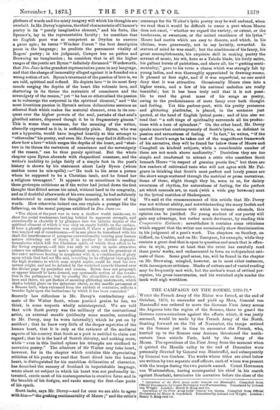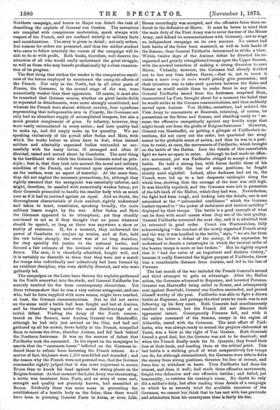THE CAMPAIGN ON THE SOMME, 1870-71.*
WHEN the French Army of the Rhine was forced, at the end of October, 1870, to surrender and yield up Metz, General von Manteuffel was ordered to move the German First Army across the Argonne into the region of the Somme, there to guard the German communications against the efforts which, it was justly assumed, would be made by the French Army of the North. Starting forward on the 7th of November, the troops arrived on the Somme just in time to encounter the French, who, hurried up to the Somme near Amiens, threatened the north- eastern lines outside Paris, held by the Army of the Meuse. The operations of the First Army from the moment when it quitted the Moselle valley to the end of December were personally directed by General von Manteuffel, and subsequently by General von Goeben. The works whose titles are cited below are written by two separate staff officers, each of whom was present with the troops during the two periods named. Count Herrmann von Wartensleben, having accompanied his chief in his march against Bonrbaki, terminates his narrative before the close of the
• Operations of the First Army under General von Manteaffel. Compiled from Official Documents by Count Herrmann yonWartensieben. Translated by Colonel von Wright. London: Henry S. King and Co.
Operations of the First Army tauter General eon Gotten. Compiled from Official Documents by Major A. Yon Schell. Translated by Colonel von Wright. London : Henry S. King anti CO.
Northern campaign, and leaves to Major von Schell the task of describing the exploits of General von Goeben. The narratives are compiled with conspicuous moderation, speak always with respect of the French, and are confined strictly to military facts and considerations. The story is given in detail ; not only orders, but reasons for orders are presented, and thus the soldier-student who cares to follow minutely the course of the campaign will be able to do so with profit, Both books, therefore, well deserve the attention of all who would really understand the great struggle, -as well as those who may benefit professionally by a close examina- tion of its progress.
The first thing that strikes the reader is the comparative small- mess of the forces employed to counteract the energetic efforts of the French. Not only in the North, but in all other parts of France, the Germans, in the second stage of the war, were numerically weaker than their opponents. Of course, it must also be remarked that German armies, whether on great battle-fields or separated in detachments, were more strongly constituted, and whereas the French were almost without cavalry, four squadrons representing that indispensable arm in Picardy, the Germans not only had an abundant supply of accomplished troopers, but also a much greater complement of guns. In infantry, however, they were vastly outnumbered in every action ; and here quality had to make up, and did amply make up for quantity. We are speaking exclusively of the period after Sedan and Metz, with which the works before us alone have to deal, when trained soldiers and admirably organised bodies contended so suc- cessfully with the hasty levies, ill arranged and often ill directed, raised and moved about by Gambetta. The next thing is the hardihood with which the German Generals acted on prin- ciple; that is, that they took into account the moral and military condition of the French, and ventured upon operations which, on the surface, wear an aspect of temerity. At the same time, they did not neglect the necessary precautions, for, although they rightly assumed that the antagonist was essentially inferior, and might, therefore, be assailed with numerically weaker forces, yet their Generals proceeded to handle the smaller body with as much care as if it had to contend against an equal. And no doubt, the thoroughness characteristic of their conduct, rightly understood and taken to heart, constitutes, speaking broadly, the main military lesson taught by the war. After Sedan and Metz the Germans appeared to be triumphant, yet they steadily continued to act as if they thought that no pains whatever should be spared, so long as there was anywhere a show or reality of resistance. If, for a moment, they underrated the power of Gambetta to conjure up armies, and at first, held the raw levies cheaply, the error was of no long duration, for they speedily did justice to the national leader, and formed a fair estimate of the intrinsic value of his numerous forces. The men, it is cheerfully admitted, fought well, and it is certainly no discredit to them that they were not a match for troops who individually and collectively had been formed by an excellent discipline, who were skilfully directed, and who were gallantly led.
The campaigns on the Loire have thrown the exploits performed -in the North somewhat into the shade, and General Faidherbe has scarcely received his due from contemporary chroniclers. Yet these volumes show that he was a very serious antagonist, and one who, had he been supplied with more means, might have reached, at least, the German communications. But he did not arrive -on the scene until a battle had been fought and lost at Amiens, and he therefore began under the moral disadvantage of an initial defeat. Finding the Army of the North concen- trated on the Somme, near Amiens, General von Manteuffel, although he had only just arrived on the Oise, and had not gathered up all his means, drove boldly at the French, compelled them to recross the river, abandon Amiens, and fall back behind the Northern fortresses. it was on the morrow of defeat that Faidherbe took the command. In his report on the campaigns he asserts that the "enormous losses" inflicted on the Germans in- 'clued them to refrain from harassing the French retreat. As a matter of fact, the.losses were 1,250 men killed and wounded ; and the reason why the French were not pursued was, that the German commander rightly judged that it was more important to secure Rouen than to knock his head against the strong places on the Belgian frontier. At that moment the Loire Army was threatening, a sortie was imminent from Paris, and an army of some sort, strength and quality not precisely known, had assembled at Rouen. Evidently there was more sense in preventing the establishment of a hostile body on the Seine, than there would have been in pursuing General Farre to Arras, or even Lille. Rouen accordingly was occupied, and the offensive force there re- duced to the defensive at Havre. It must be borne in mind that the main duty of the First Army was to cover the rear of the Meuse Army, and defend its communications with Germany, not to wage an independent campaign on its own account. No sooner had both banks of the Seine been mastered, as well as both banks of the Somme, than General Faidherbe determined to strike a blow. Within twelve days of the Amiens defeat he directtd his re- organised and greatly strengthened troops upon the Upper Somme, with the avowed intention of making a strong diversion to save Havre. Virtually, however, the Germans had already decided not to lose any time before Havre,—that is, not to touch it unless a mere coup de main would plainly give possession ; and their intention was to take such quarters between the Seine and Somme as would enable them to make front in any direction. General Faidherbe issued from the fortresses, surprised Ham, reconnoitred La Fere, brought about for a moment the belief that he would strike at the German communications, and then suddenly moved upon Amiens. Vun Moltke, meantime, had ordered the First Army to concentrate at Beauvais, retaining, of course, its possessions on the Seine and Somme, and standing ready to " as- sume the offensive energetically against any hostile corps that might break out from the girdle of Belgian fortresses." However, General von Manteuffel, on getting a glimpse of Faidherbe's in- tentions, did not carry out the order, but quartered the army nearer to the probable scene of action, and thus he was in a posi- tion to resist, at once, the movements of Faidherbe, which brought on the battle of the Hallue. Into the details of this remarkable fight we have no space to enter. Although he had made an offen- sive movement, yet was Faidherbe obliged to accept a defensive battle. He held a strong line, with forces double those of his opponent, and with the loss of some positions, he fought stoutly until nightfall. Indeed, after darkness had set in, the French were led up to a last desperate onslaught along the whole line, showing that the courage of the host was still high. It was bloodily repulsed, and the Germans were left in possession of the left bank of the Hallue, which they had won. Nevertheless, the fight had been tough, and looking into the details, one is not astonished at the " unbounded confidence" which the German leaders reposed in " the power of endurance and tactical mobility" displayed by their troops. The battle is a good example of what can be done with small means when they are of the best quality. General Faidherbe retreated the next day, and it is admitted that he retreated in good order. Count von Wartensleben, fully acknowledging "the conduct of the newly organised French army and the way it was handled in the battle," says, " we are far from calling the latter a defeat of the enemy, if this expression be understood to denote a catastrophe in which the tactical order of the beaten troops is more or less broken." But he rightly argues that it "had the value of an important and decisive victory," because it really frustrated the higher purpose of Faidherbe, threw him a considerable distance from Amiens, and led to the loss of Peronne.
The last month of the war included the French General's second and third attempts to gain an advantage. After the Hallue action, the Germans advauced to Bapaume, and invested Peronne. General von Manteuffel being called to Rouen, and subsequently sent against Bourbahi, General von Goeben succeeded, and proved himself worthy of the post. Faidherbe was able to fight a drawn battle at Bapaume, and perhaps the chief error he made was in not following up his fiery onset. Both Generals had simultaneously resolved to retreat, but the French did not discover their opponents' intent. Consequently Peronne fell, and with it the entire command of the Somme, except in the region of Abbeville, rested with the Germans. The next effort of Faid- herbe, who was always ready to second the projects elaborated at Tours, was a blow at the right of Von Goeben. Both Generals fenced a good deal, but the German was not to be deceived ; and when the French finally made for St. Quentin, they found their foes at their heels, and heading them at the critical point. This last battle is a striking proof of what comparatively few troop can do, for although outnumbered, the Germans were able to drive the enemy from strong positions, threaten his line of retreat, and force him to withdraw in haste. Thus Faidherbe had done his utmost, and done it well ; had made three offensive movements, fought two defensive and one offensive battles ; and failed, yet honourably, to retrieve his country's cause.. No doubt he only did a soldier's duty, but after reading these details of a campaign in which he so severely tried the available resources of the Germans, we cannot but think that he has met with less gratitude and admiration from his countrymen than its fairly his due.



































 Previous page
Previous page